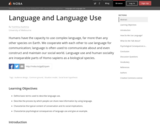
Text and links to all ancillary materials for Module 22
- Subject:
- Psychology
- Social and Behavioral Sciences
- Material Type:
- Module
- Reading
- Teaching/Learning Strategy
- Author:
- Yoshihisa Kashima
- Date Added:
- 05/31/2021

Text and links to all ancillary materials for Module 22
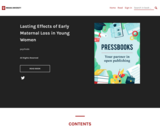
Losing a parent can be a devastating experience for any child, but there are specific struggles that accompany early maternal loss for the daughter. Author Hope Edelman, who lost her mother to breast cancer, researches and writes extensively on this topic. Using Edelman as the foundation, this paper will explore how maternal loss during childhood and adolescence impacts women throughout their lifetime, from teenage identity struggles to becoming mothers themselves.
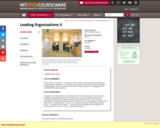
Analyzes - through lectures, discussions, and class exercises - the human processes underlying organizational behavior. Through lectures, discussions, and class exercises, 15.322 analyzes the human processes underlying organizational behavior and change. The class makes students aware of the challenge of organizational change and equips them to better handle it. There are many psychological and sociological phenomena that regularly occur in organizations, though many of these forces are difficult to see. The aim is to increase the students' understanding of these forces -- in themselves and in others -- so they become more visible and manageable.
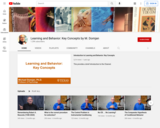
This is a YouTube channel with about three dozen short (15 min) talks about various topics related to learning and behavior or conditioning and learning. The talks cover the full range of topics typically included in a course on learning, including habituation, classical conditioning, instrumental conditioning, schedules of reinforcement, theories of reinforcement, behavioral economics, the Premack principle, extinction, stimulus control, and memory, The talks were written and delivered by Michael Domjan, Professor of Psychology at the University of Texas at Austin and are based on Domjan's popular textbooks, The Principles of Learning and Behavior (published by Cengage) and The Essentials of Conditioning and Learning (published by the American Psychological Association). The number of talks and range of topics is sufficient to make up all of the lectures needed for a course on learning.
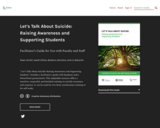
"Let’s Talk About Suicide: Raising Awareness and Supporting Students" includes a facilitator’s guide with handouts and a PowerPoint presentation. This adaptable resource offers a sensitive, respectful, and detailed training on suicide awareness and response. It can be used for two-hour synchronous training or for self-study.

Introduction to Lifespan DevelopmentLifespan Development examines the physical, cognitive, and socioemotional changes that occur throughout a lifetime. This course covers the essentials in understanding human development, psychological research, and theories of growth and development. Students will come to understand the lifespan perspective and to analyze growth through each of the major stages of development: prenatal development, infancy, early childhood, middle childhood, adolescence, early adulthood (including emerging adulthood), middle adulthood, and late adulthood. The course covers key topics in each of these stages, including major developmental theories, genetics, attachment, education, learning, disabilities, parenting, family life, moral development, illnesses, aging, generativity, and attitudes towards death and dying.
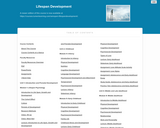
Growth and development through the lifespan including physical, social, cognitive and neurological development. This course covers topics in each of these areas and provides an overview on subjects such as day care, education, disabilities, parenting, types of families, gender identity and roles, career decisions, illnesses and treatments, aging, retirement, generativity, and dying.
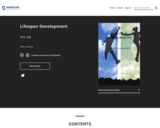
This textbook is an introduction to human development as it relates to psychology.

Developmental Psychology, also known as Human Development or Lifespan Development, is the scientific study of ways in which people change, as well as stay the same, from conception to death. You will no doubt discover in the course of studying that the field examines change across a broad range of topics. These include physical and other psychophysiological processes, cognition, language, and psychosocial development, including the impact of family and peers.

Growth and development through the life span including physical, social, cognitive and neurological development. Topics covered included daycare, education, disabilities, parenting, types of families, gender identity and roles, career decisions, illnesses and treatments, aging, retirement, generativity, and dying.Login: guest_oclPassword: ocl
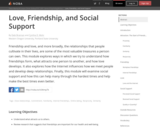
Text and links to all ancillary materials for Module 56
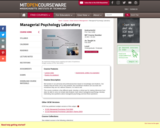
Core subject for students majoring in management science. Surveys individual and social psychology and organization theory interpreted in the context of the managerial environment. Laboratory involves projects of an applied nature in behavioral science. Emphasizes use of behavioral science research methods to test hypotheses concerning organizational behavior. Instruction and practice in communication include report writing, team decision-making, and oral and visual presentation. Twelve units may be applied to the General Institute Laboratory Requirement.
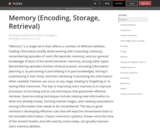
Text and links to all ancillary materials for Module 14
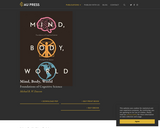
Cognitive science arose in the 1950s when it became apparent that a number of disciplines, including psychology, computer science, linguistics, and philosophy, were fragmenting. Perhaps owing to the field’s immediate origins in cybernetics, as well as to the foundational assumption that cognition is information processing, cognitive science initially seemed more unified than psychology. However, as a result of differing interpretations of the foundational assumption and dramatically divergent views of the meaning of the term information processing, three separate schools emerged: classical cognitive science, connectionist cognitive science, and embodied cognitive science.
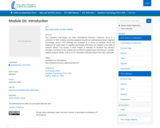
The Cognitive Psychology: An Open Educational Resource Collection (v0.1) is a collection of OER reading materials targeted towards an undergraduate-level Cognitive Psychology course. The readings are arranged in a series of modules which are organized by major topics in cognitive psychology (referred to as chapters in the table of contents below). The content in each chapter is intended to introduce key theories, concepts, and terms to the students and should be supplemented with lectures, activities, original research articles, and so on for information that goes beyond the topic overviews.
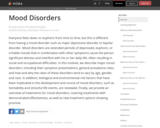
Text and links to all ancillary materials for Module 41
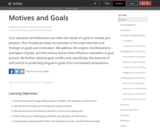
Text and links to all ancillary materials for Module 29
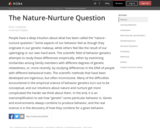
Text and links to all ancillary materials for Module 8
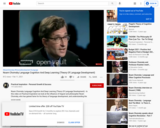
Noam Chomsky Language Cognition And Deep Learning (Theory Of Language Development) - In this video on Practical Inspiration we look at the influence of linguist and philosopher Noam Chomsky, who has gained fame for his theory of language development, and understanding the influence of how language cognition and deep learn, and the idea of Noam Chomsky language acquisition.
Noam Chomsky's theory of language development has had a great influence in the field and his philosophical view of the world and its influence on our psychology, has lead many to seek his views and opinions, including in the 2020 election and what is the future of the USA.
So let's learn from Noam Chomsky in 2021, even arguing why Noam Chomsky is wrong or manufacturing consent, as we look to self help and see personal development.
Duration: 7:27.

Complied in Spring 2023. List of Open External Resources for Experimental Psychology/Research Methods in Psychology.